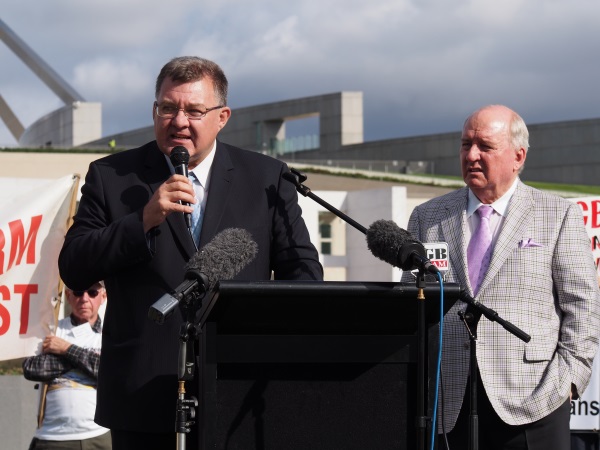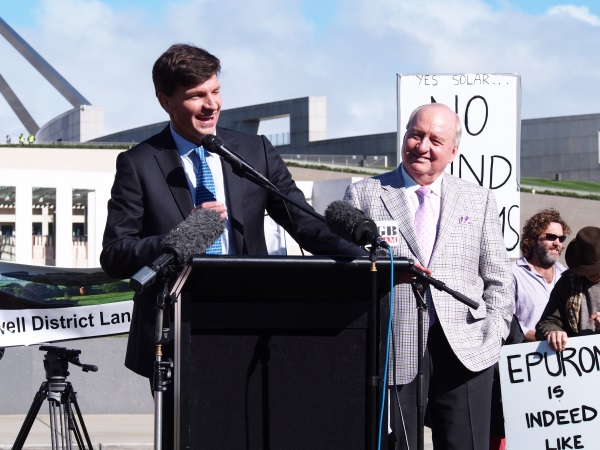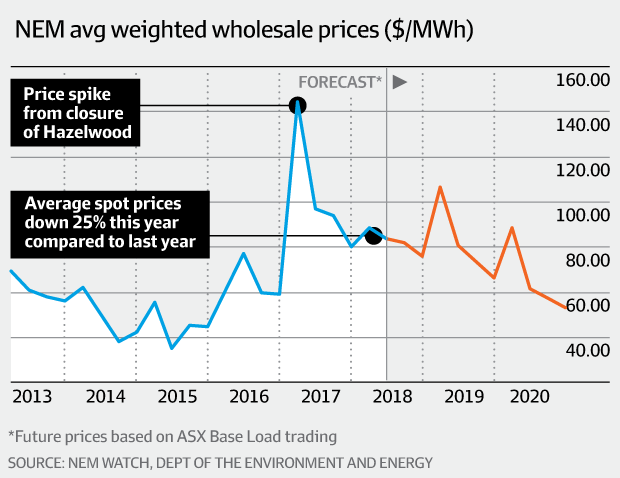
The world was overrun by insanely costly and chaotically intermittent wind and solar, thanks to an endless stream of other people’s money.
Preaching the gospel about nature’s wonder fuels, isn’t simply about moral posturing and virtue signalling. It’s also about separating taxpayers and power consumers from their hard-earned: over the life of the Federal government’s Large-Scale Renewable Energy Target, the greatest state-sanctioned defalcation in history will cost power consumers more than $60 billion.
But the consequences of all that moralising at other people’s expense, aren’t just financial.
The result of the subsidies (which give wind and solar preferential access to the grid) and the inherently chaotic delivery of wind and solar has placed Australia’s Eastern Grid on the brink of collapse. This summer is guaranteed to result in mass blackouts and routine load shedding, every time the wind stops blowing and/or the sun sets.
With rocketing prices and a rickety grid, the days of Wine and Roses for wind and solar are well and truly over. Their demise has a name: Angus Taylor.
Angus Taylor is the first Energy Minister in more than 20 years that doesn’t sound like a lunatic from the green-left fringe. Phrases such as “sustainable energy” and “inevitable renewable energy transition” are out. Replaced by terms such as “fair dinkum power”: the stuff that actually keeps the lights on 24 x 7, whatever the weather. And, in Australia, that means coal-fired power.
Angus Taylor-made package prolongs coal’s power
The Australian
Samantha Hutchinson
20 September 2018
Newly appointed federal Energy Minister Angus Taylor will consider a plan to upgrade the efficiency of Australian coal-fired power stations to improve performance, cut emissions and prolong their operating lives, among a suite of options to shore up the national power supply.
As the minister plots a course to boost the supply and reliability of Australia’s baseload power, sources say the government will run the rule over a package offering support to help companies upgrade or expand existing power stations.
Mr Taylor declined to confirm or deny which approach was likely to form a central plank of the Coalition’s energy policy, but said reliable supply was key.
“We’re backing investment in reliable supply and competition and that could be an expansion of an existing facility or whatever support it needs, but it could also be a new facility next door or even a completely new investment,” Mr Taylor said.
“What we need is supply and competition of reliable baseload power and we’re neutral to the technology and the source, but the outcome and the idea is simple: we need more supply and competition and many different sources where it could come from.”
Sources in the federal government told The Australian the plan had been under the consideration of former energy and environment minister Josh Frydenberg and was now among a suite of options Mr Taylor will consider as he formulates a national energy approach.
Sources in the department indicated a range of funding options were floated for consideration under the former minister, including a dedicated efficiency-upgrade fund, as well as attractively priced loans and matching funding for companies. Plans drafted before Mr Taylor came to parliament are understood to have focused on coal-fired power stations with a life expectancy of more than 20 years.
This would rule out AGL’s Liddell power plant, west of Sydney, which provides one-fifth of the state’s energy supply and is set to close in 2022.
But it could provide an attractive option for power companies owning newer stations, such as Victorian brown-coal power station Loy Yang B, which was slated for an upgrade on commercial terms before it changed hands in late 2017.
Consideration of the plan for refurbishment and upgrades represents a breakthrough for the Coalition, and after months of pressure from Coalition MPs saying that any government support for new coal power stations must also extend to the upgrade or refurbishment of the existing fleet.
Federal Liberal and Nationals MP including minister Dan Tehan, frontbencher Keith Pitt, as well as Craig Kelly and Tony Pasin have been among a group of Coalition MPs calling for a $5 billion fund to build new coal-fired power stations as well as upgrade existing ones.
A source in the Nationals told The Australian the current consideration for an upgrade plan represented a more cost-effective approach that could shore up baseload energy supplies quicker and cheaper than a new-build plan.
There was also the possibility that the plan and funding could be in train before the next election, they added.
Another source said government efforts to prolong the operating life of the country’s current fleet of coal-fired power stations had gained support in past months, particularly among a group of Coalition MPs who toured upgraded coal stations in Japan this year.
The Australian

Samantha Hutchinson seemed to struggle in that article, with a mixture of straw-clutching and ponderous-speculation dressed up as reportage.
Much of her ‘information’ clearly emanates from the former Energy Minister, Josh Frydenberg’s office.
On Frydenberg’s watch, Australia’s energy situation went from dire to catastrophic. So, Frydenberg’s camp is hardly the best source for a journalist looking to find out what is likely to happen to energy policy in this Country, now that Angus Taylor is firmly in charge.
In future, Samantha Hutchison would be far better off getting it direct from the horse’s mouth.
Indeed, Samantha could have done her readers a service by glancing over a copy of the Australian Financial Review and this article, that went to press a couple of days earlier.
Cut the energy virtue signalling and start serving customers
Financial Review
Angus Taylor
18 September 2018
In today’s energy market, someone profound has been forgotten: the customer.
Boards and chief executives have become increasingly obsessed with “triple bottom lines”, environmental targets, diversity training and corporate social responsibility reports. But businesses are not sustainable unless they deliver customers a fairly priced quality product or service.
If you forget customers, competitors and governments are sure to remind you. Nowhere is this more important than utilities providing essential services – such as electricity – to all Australian households, businesses and other organisations, including hospitals and schools.
As we have seen with the banks, a raw deal on essential services angers Australians. No amount of corporate virtue signalling or spin will make up for customers who feel ripped off.
When Prime Minister Scott Morrison appointed me minister for energy, he gave me one clear KPI – to lower power prices while keeping the lights on.
Australian household prices doubled when Labor was last in government, with sharp increases in wholesale prices in recent years. While wholesale and retail prices have now turned the corner, we still have a long way to go. Australians are struggling with the cost of living, and many small businesses are not able to take advantage of new opportunities.
Higher electricity prices cost Australian jobs in sectors including agriculture, aluminium, steel, cement and manufacturing.
A clear plan
This government’s solutions will not be driven by ideology or grand gestures, but pragmatism. Our plan is clear.
First, we will not hesitate to intervene to stop the price-gouging. I am no advocate of increased government intervention in the market, but energy companies need to re-embrace their customers and give them a fair deal.
The Australian Competition and Consumer Commission voiced its concerns about the lack of competition in wholesale and retail markets, and the high-price customers are paying as a result.
We will move to prevent unreasonable late payment penalties, strengthen the powers of regulators to tackle dodgy practices and continue to crackdown on rampant over-investment in distribution and transmission.
With wholesale prices now well off their peaks and energy company profits at record levels, we need to see wholesale price reductions passed through to customers.
Second, we will establish a price safety net to empower customers to get the best deal, ensuring retailers are held to account. Establishing a fair market default price, and ensuring offers and plans provide simple comparisons against this, mean people will get fair deal even when they don’t have time to shop around. Confusing customers for profit has to stop.
Third, we will back investment in baseload generation to retain supply and encourage competition. We will force divestments if necessary. Opening up our abundant natural resources – gas, coal, water and the sun – will ensure Australians receive the cheapest and most reliable electricity.
Stretched to the limit
The reliability of our electricity grid is under pressure. The renewable energy targets in Victoria, Queensland and the ACT are dramatically worsening this situation, with unprecedented additions of intermittent wind and solar putting pressure on reliable baseload generators to exit.
The Victorian grid will be stretched to the limit this summer. Given its 50 per cent Renewable Energy Target, South Australia now has among the highest prices in the world and poor reliability.
The sharp price increases and loss of reliability and security after the closure of Northern in South Australia and Hazelwood in Victoria demonstrate how this plays out, as the ACCC analysis showed.
Meanwhile, emissions reductions are the least of our problems, with every prospect we will reach the 26 per cent reduction below 2005 levels ahead of schedule and without interventions.
Bipartisanship is preferable, but Labor needs to decide if it accepts our unambiguous focus on lower prices while keeping the lights on.
We won’t accept Labor’s 45 per cent Emissions Reduction Target and 50 per cent Renewable Energy Target. Their plan to take the failed South Australian experiment national will take a wrecking ball to our economy.
The situation is dire enough without interventions that will drive up prices and drive down reliability by prematurely driving out coal and gas.
Australians have had enough of unaffordable power bills driven by Labor’s virtue signalling, and of corporate greed dressed up as saving the planet. It’s time to go back to basics and put customers first.
Financial Review



So now the government is looking to offer low cost loans or subsidies to coal generators for refurbishment etc.
In other words the government is going to spend more of our money to try to address part of the mess that they alone created!
Politicians are just dumb!
Level the playing field by removing subsidies, the RET, etc.
If the RE generators cannot produce power on a reliable basis, they should have to provide and pay for their own backup!
Reblogged this on "Mothers Against Wind Turbines™" Phoenix Rising….
The individuals of the South Australian former Labor government should be held to account for what they did in that state, not least of which was the wanton vandalism of the people’s power stations.
Agreed, what occured was a crime against their people. More than 50,000 households live without power now. Tom Playford must be spinning in his grave.
I have had a vague idea on how to accomplish this for a while. When it comes time to load shed … sorry .. ‘demand manage’, the first areas to be disconnected are the voting districts with MPs who support the idiotic sunhine and rainbow plans.
I bet after a few days of missing their soy lattes and WiFi residents of said districts will change their minds rather quickly. If these voters had to suffer the consequences of their voting first hand, they’d switch sides faster than a tennis ball at Wimbledon.
Angus would do us all a favour if he came clean and said ‘I want to abolish all subsidies for electricity generation now including the RET and REC but it is government policy to retain it so I will work to improve reliability and reduce prices within the ambit of that policy – please assist me by lobbying your local members to achieve abolition of the RET and REC and then I guarantee I can quickly achieve a turnaround from the current chaos and absurdly high prices.’ Unless he does this then he is left fussing around the edges.